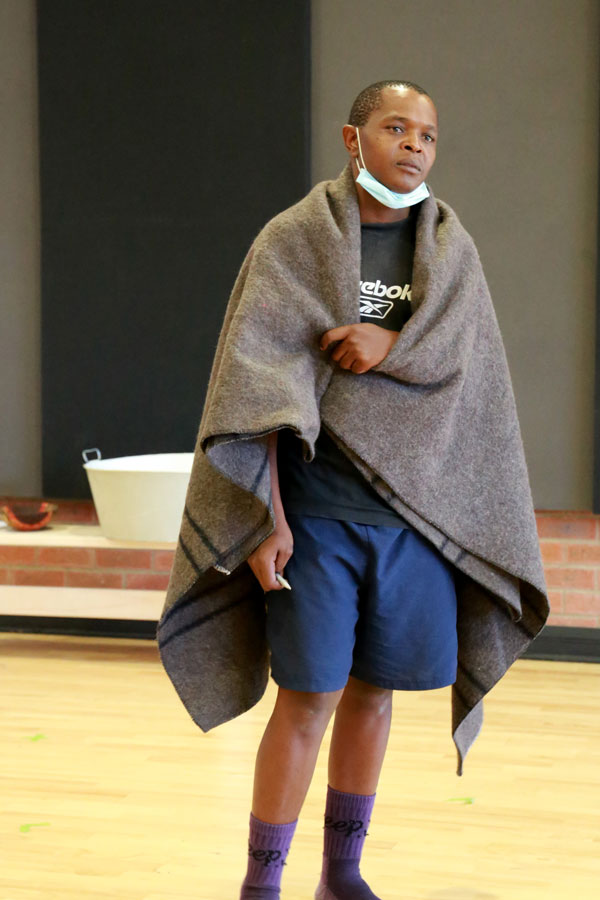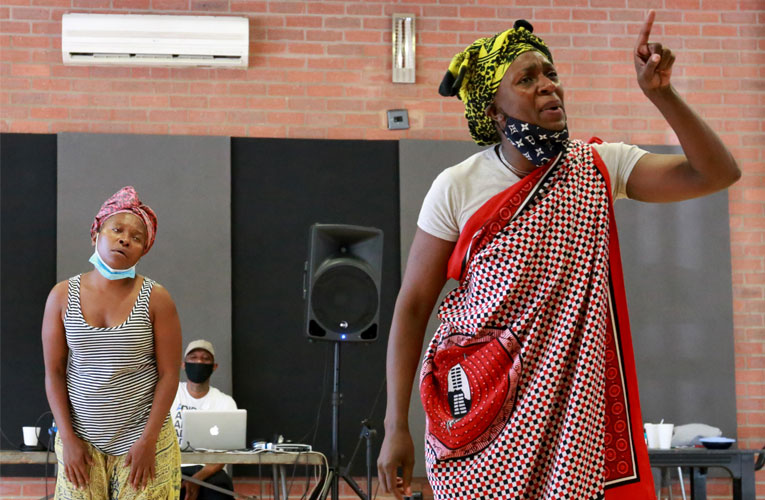South African minority languages finally given space on theatre stages
The production Father Come Home/Tate Etla Gae by E’skia Mphahlele is expected to bring diverse audiences, especially sePedi speakers and enthusiasts to the Market Theatre this February.
By Edward Tsumele
Sometime last year, at a restaurant owned by a theatre other than the one where he works, (the location was the venue during level 2 lockdown was convenient to both of us) holding the influential position of artistic director, well known theatre director and actor James Ngcobo, opened up about his future artistic plans at the Market Theatre. That is once the lockdown allowed theatres to operate in a relatively safe environment for both theatre staff and actors. Those plans included delving deep into South African stories, that are rich in culture, but sometimes unfortunately find themselves on the periphery of mainstream theatre due partly to cultural prejudice by theatre programmers, producers, and even the lack of written scripts for such stories, particularly in South Africa’s myriad of indigenous languages.
The ones suffering the most in this case happen to be especially the minority languages, which ironically have equal rights just like the main ones such as English, isiZulu, Afrikaans and isiXhosa, languages which enjoy various privileges on South African stages. The rationale is that such majority languages, understood and spoken by a large number of South Africans are more likely to be commercially viable to be put up on stage due to the expected bums they are expected to pull to the theatre’s seats. No problem there as theatre, like any other business puts profitability potential first before other consideration, such as the small issue of considering extending the same privilege afforded majority languages to constitutionally protected minority languages. Such languages, equally rich in culture and pregnant with intellectually stimulating stories, including xiTsonga, seTswana, Tshivenda, isiNdebele, isiSwati and Sepedi and seSotho, to mention but just a few, tend to be forgotten by theatre programmers.

However recent South Africa theatre history has somehow demonstrated the potential for viability for such stories, delivered properly in these minority languages. Diverse audiences, irrespective of the language limitations, have in a few cases of such languages afforded an opportunity on stage, embraced the plays. Examples of these are Ga-Mchangani by Obedi Baloyi, delivered to critical acclaim when it was staged at the Market Theatre some years ago when Baloyi graduated from the Market Theatre Laboratory, and in recent years Lepatata,, written by Moagi Modise, commissioned by the Market Theatre and delivered in seTswana, which was equally critically acclaimed and equally embraced by a culturally diverse audience. A seSotho play, Eo U Neileng Ena – directed by Selloane Lalu Mokuku 2016, also performed at the Market Theatre stages, also did well aesthetically and with regards to audience numbers and response.
Still, even in contemporary music lyrics, minority languages such as xiTsonga and seTswana are very much part of popular contemporary music culture in South Africa. In the current wave of one of the most popular music genres of the moment hitting the country, rap music, both languages (xiTsonga and seTswana) feature prominently, and the mainly youth fan base of these genres have embraced the use of lyrics in these minority languages in these music genres.
For example the popular Motswako brand of hip hop, pioneered by the late Hip Hop Pantusla (Jabulani Tsambo) propelled seTswana into mainstream music culture in recent years, and so does internationally acclaimed xiTsonga rapper and gqom exponent Sho Madjozi propel xiTsonga into mainstream popular culture in South ASfrica and internationally. All this may point to the fact that given the same attention, respect for their aesthetics and the dynamics of the cultural contexts in which they exist, plays in indigenous minority languages can equally enthrall an audience, irrespective of the language limitations.
And therefore it is heartening that thespians who hold senior positions in theatres, deciding what is put on theatre stages , such as Ngcobo, the artistic director of the Market Theatre, are looking beyond productions confined to majority languages for content. That is not only a show of bravery, especially with the lingering risk of inviting tried and trusted audiences to try something new in their thetare lives, but is is also visionary at another level. This is especially significant in as far as developing new theatre audiences is concerned.
The case in point is the Market Theatre production Father Come Home/Tate Etla Gae, which will grace its stages this February.
The production pays tribute to the late internationally revered South African literary giant E’skia Mphahlele. The piece is adapted from Mphahlele;s novel . novel Father Come Home and will be performed in sePedi from 9 – 28 February 2021. sePedi is one of the minority languages, alongside Tshivenda and xiTsonga, which are spoken largely in Limpopo Province.

The production forms part of the Indigenous Languages programming that Ngcobo spoke about when I met him last year at that somehow noisy theatre restaurant on a Friday mid-morning, as part of the 45 years celebrations of the existence of the Market Theatre in 2021. It is funded by the Department of Sports, Arts and Culture Incubation Programme.
Father Come Home(Tate etla Gae)translated by Rami Chuene, South Africa’s award winning actress and an author.Father Come Home/Tate etla Gae is adapted for stage and directed by Clive Mathibe. Mathibe, has assembled an award winning cast to tackle this production that reflects the experiences of countless black South African families.
Tau Maserumule leads the award winning cast alongside Shoki Mmola, Marcus Mabusela, Josias Moleele and Kedibone Manyaka who will take on the mammoth roles of delivering this pioneering theatre piece in sePedi.
Mphahlele is a renowned author of two autobiographies, more than 30 short stories, two verse plays and a fair number of poems. In a career spanning over 60 years he received local and international awards most notably was his nomination for the Nobel Prize in literature in 1968.
Mphahlele believed that the regeneration of African consciousness is essential to real African development and progress. And his novel, Father Come Home is presented through the protagonist, Maredi. He portrays a boy’s struggle of growing up in a traditional village where manhood is defined by family/clan names and the cultural rites of passage. Maredi grows an emotional and desperate need to define himself through knowing his father. Growing up without a father figure has a profound effect on boys that lasts into manhood.
Maserumule who trained at the Market Theatre Laboratory has landed some dynamic roles alongside South Africa’s finest talent. Mmola born in Tzaneen is famous for her role as much loved by fans across the country as Celia in one of Mzansi top soapie SABC 1 Skeem Saam.
Moleele adds mature flair of both television and theatre accolades. Moleele wrote and directed award winning production Call Us Crazy that played to sold out houses at the Market Theatre and its success still lingers in the theatre’s walls till today. In fact it was through this play that the actor and academic cemented his hold on contemporary South African theatre. To date he is still to come up with a play that will surpass that success achieved by Call Us Crazy.
This formidable cast is expected to draw diverse audiences creating a wider appeal for the show, especially bringing sePedi speaking and language enthusiasts, who all along like other minority languages have been neglected by theatre producers and script writers, to the theatre. Father Come Home/Tate Etla Gae will premier Tuesday 9 to 28 February 2021.
PRODUCTION INFORMATION CREATIVE TEAM
Writer E’skia Mphahlele
Writer – Translator Rami Chuene
Writer- Adaptor and Director Clive Mathibe
Set & Costume designer mentor Onthatile Matshidiso
Lighting Designer mentor Hlomohang Mothetho
Sound Designer mentor Mandla Mkaba
Stage Manager mentor Mokokobale Makgopa
Department of Sports Arts and Culture Incubatees
Set Designer mentee Antonie Adams
Lighting Designer mentee Rendandi Nekhudzhiga
Costume Designer mentee Bohlokoa Matlabe
Sound Designer mentee Lebogang Rammala
Stage manager mentee Kekgaogetswe Rakopa
Performers
Tau Maserumule
Shoki Mmola
Marcus Mabusela
Josias Moleele
Kedibone Manyaka
Age Recommendation 13
Season: Tuesday 9 – Sunday 28 February 2021
Venue: The Mannie Manim Theatre
Performance times: Tuesday – Saturday @18h00 and Sunday @15h00
Ticket prices: Tuesday – Thursday R90.00 Friday – Saturday R150.00 and Sunday R130.00
.Father Come Home/Tate Etla Gae premiered on Tuesday 9 to 28 February 2021. Shows time is – Saturday @18h00 and Sunday @15h00










